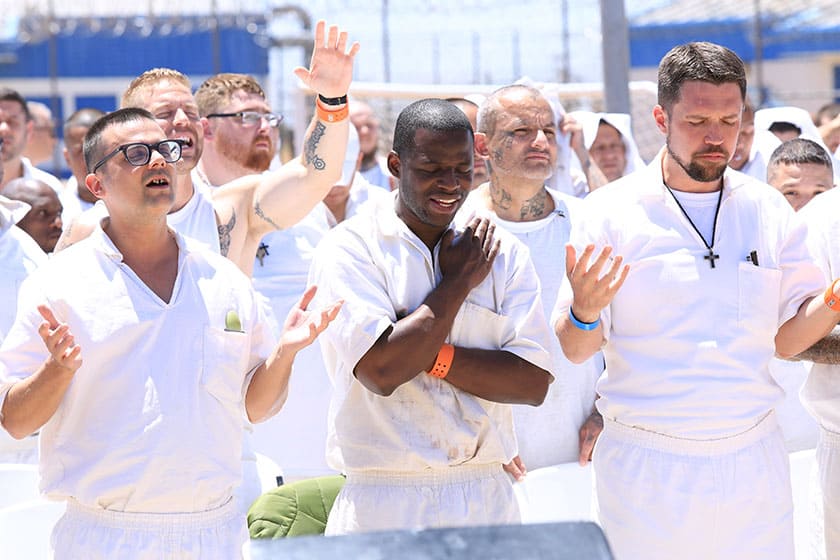
This great God …
Kneeled down in the dust
Toiling over a lump of clay
Till He shaped it in His own image;
—from The Creation, by James Weldon Johnson
At Prison Fellowship®, the question Who is my neighbor? is not rhetorical. It's not philosophical. As the nation's largest Christian nonprofit serving prisoners, former prisoners, and their families, and a leading advocate for criminal justice reform, we embrace the question Who is my neighbor? in everything we do—within prison cells and in the halls of power—as we uplift the essential biblical mandate "Love your neighbor as yourself."
Our perspective is rooted in the "Book of Beginnings," Genesis, which records God's starting point with humanity. In God's own image, the imago Dei, God created humankind to live fruitfully and harmoniously in just and productive community as an expression of the Trinitarian fellowship of Father, Son, and Holy Spirit. Old Testament commandments further attest to the three-way relationship God intended, with love of the Creator first, complemented by love of neighbor and self. (Deut. 6:5 and Lev. 19:18, respectively)
The tragic truth, however, is that since the fall of humanity, individual and systemic sin have threatened and destroyed the safety and peace God intended. Humanity emerged alienated from God and alienated from one another. The result: Broken lives, relationships, and communities in need of the restoration and justice envisioned and empowered by God and His Word.
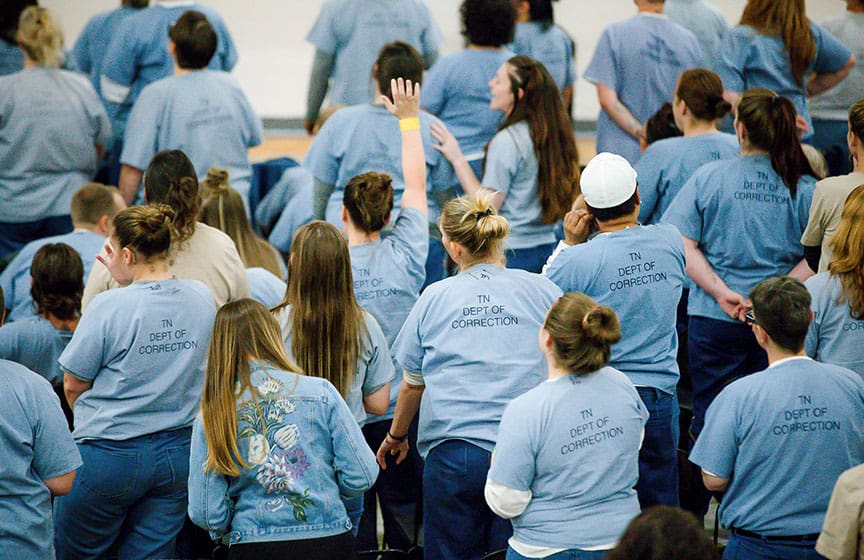
THE WORD BECAME FLESH
As Christians, we believe Jesus the Incarnate Word entered this world of endemic sin, bringing salvation. Preaching, modeling, and sharing agape—unconditional love—Jesus established God's divine pathway back to peace, restoration, and reconciliation. Through His death, burial, and resurrection, Jesus offers hope, healing, and a new purpose for each life.
With His parable in the 10th chapter of Luke, Jesus illustrates what restoration looks like. Reversing all "other" thinking and designations, Jesus establishes "neighbor" as "the one who had mercy." To the self-justifying religious scholar claiming to desire salvation, Jesus says, "Go and do likewise." (Luke 10:30-37) And in doing so, Jesus teaches that God's Kingdom multiplies individual salvation for community and systemic transformation.
Heeding Jesus' instruction, for more than 40 years Prison Fellowship has worked to facilitate prisoners' rehabilitation, supported their families, and advocated for a criminal justice system that reflects the God-given dignity and potential of all individuals. Our work involves programming and justice reform that serve people from a wide range of racial backgrounds.
Besides being in the same prison at the same time, Jesse Wiese and Quovadis "Q" Marshall remember encountering each other in there and that it was obvious they were as different as black and white. "Jesse is an introvert, but I," admits Quovadis, "am an extreme extrovert. I grew up poor, but he grew up pretty affluent. He went to private Christian schools, so I think I was the second Black friend he had."
A NEW COMMAND: LOVE ONE ANOTHER
It wasn't friendship at first sight. Prison culture is often rife with unspoken social expectations. Prisons can be highly segregated and often charged with racial tensions. Community generally is found with those who are the same, with the first factor being skin color and the second being gang affiliation. The status quo in prison: stay with your own kind.
Jesse, who worked in the library, was truly annoyed when Quovadis and his friends came in and talked about the Bible and theology. "I thought a lot of what [Quovadis] said was wrong and inaccurate," says Jesse, who one day joined in—and a "lively debate" ensued.
"I remember thinking, Who's this white uppity rich kid?" Quovadis says.
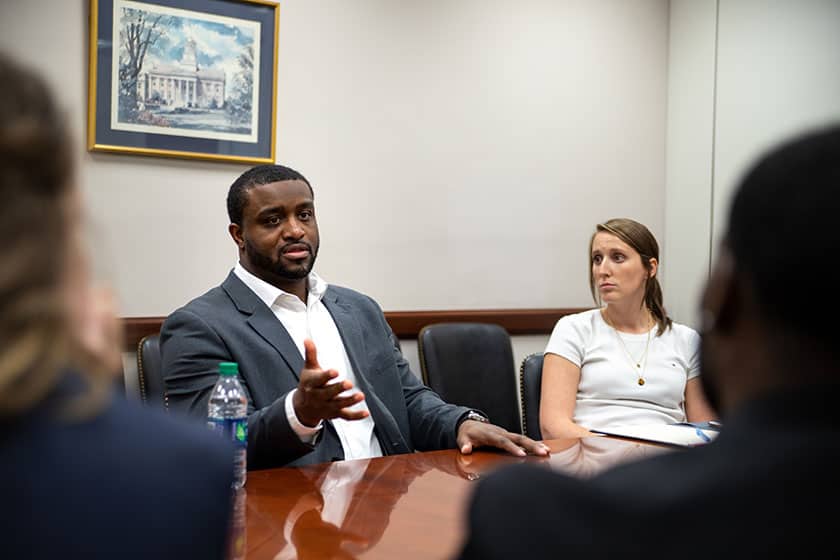
ONE IN CHRIST
Finding their way into the Prison Fellowship Academy®, both Jesse and Quovadis became part of a cohort of prisoners who journeyed together through a year-long program of targeted curriculum and compassionate coaches to develop and practice the biblically based values of community, affirmation, productivity, responsibility, restoration, and integrity.
Along the way, Quovadis and Jesse quickly learned that in the Kingdom of God, you can find brotherhood with those who are different. While still in prison, they became roommates for a while before both were transferred to a minimum-security facility. They planted a church in that facility, learning that their different spiritual gifts complemented each other well. Along the way, they discovered a tie that binds them that is stronger than their differences. So much so that when each tied the knot, Quovadis and Jesse were each other's best men at their weddings. Today, both work with Prison Fellowship—Jesse on staff and Quovadis’ congregation is very active with Prison Fellowship Angel Tree™, and he partners with the ministry advocating for justice that restores. Close for nearly two decades now, they say they are more than faithful friends; they are brothers.
Through our work in the Academy, we know firsthand that our neighbor is—like all human beings and communities—never static. Whether solo or in groups, people are dynamically shaped and molded through productive—or destructive—influences and interactions. The brokenness that lands men and women in prison, left unaddressed, perpetuates a cycle of destructive thinking and behaviors that impacts individuals and communities—both inside and outside prison walls. Today, the Academy boasts 113 sites in 30 states.
CHANGED PEOPLE CHANGE PEOPLE
Since Prison Fellowship's founding in 1976 by Charles "Chuck" Colson, we've recognized that loving our neighbor requires not only relationship building, but advocacy. Chuck had found a new life in Jesus before and after his incarceration for a Watergate-related crime. He invested the rest of his life speaking to prisoners behind the razor wire and on behalf of prisoners in the public square.
As believers who have experienced the ultimate second chance by receiving God's forgiveness through Christ, we continue Chuck's legacy. Drawing on our frontline experience, we mobilize Christians and equip policymakers to call for federal and state justice reforms that advance proportional punishment, constructive corrections culture, and second chances. By engaging churches and communities in a more restorative approach to justice, we envision a safer, more redemptive society that validates victims and transforms those responsible for crime.
Mobilizing churches and grassroots advocates, Prison Fellowship has played a leading role in hundreds of state reforms and landmark federal legislation including the Second Chance Act (2008), the Fair Sentencing Act (2010), the FIRST STEP Act (2018), and restoring Pell Grants access to all eligible incarcerated students (2020). And while we celebrate these victories, there is yet much work to do.
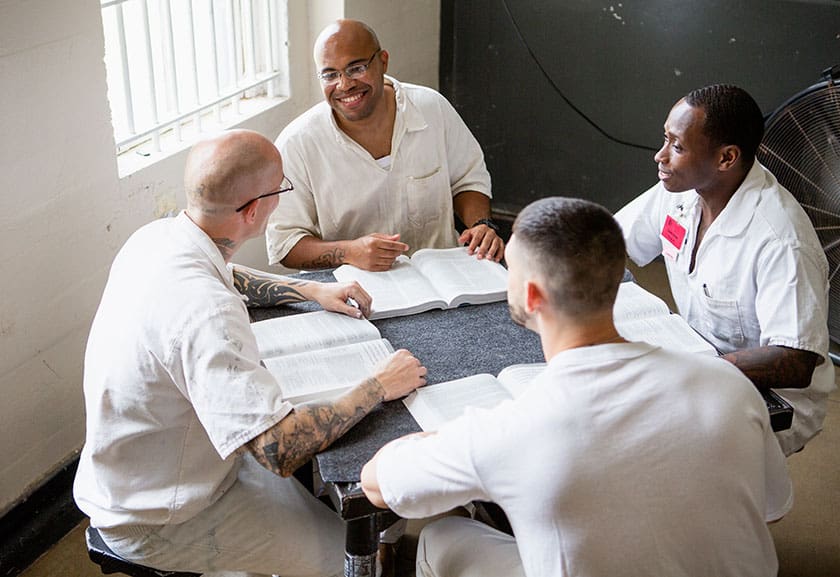
FACING RACISM
Our experience in prisons has brought us face to face with the racism that confronts our neighbors of color, and we have witnessed firsthand the stark racial disparities in the criminal justice system. For instance, as the data attest, Black males often experience greater rates of arrest, greater use of force under apprehension and while in custody, higher occurrences of prosecution, and harsher sentences. Racial bias and injustice contribute directly to these trends, as do other pervasive upstream issues like instability in housing and family structures, unequal access to quality education, and poverty.
Due to the complexity of the justice system, the law provides limited but important opportunities to correct racial disparity. Prison Fellowship works hard every day to advance justice that restores and reflects the God-given value of all persons. In some cases, legislation like the Equal Act can help mitigate inequalities, and we have been advocating for proportional sentencing and justice that addresses the systemic biases and prejudices borne by people of color. We also acknowledge that the ultimate elimination of racial bias requires each of us to consider our own beliefs, attitudes, and positions in light of the Gospel and with the help of the Holy Spirit.
FROM VULNERABLE TO VICTORIOUS
Meanwhile, we continue to serve neighbors who are among our society's most vulnerable: children with parents in prison. There are the 1.5 million young people in this country with a parent in prison. Facing persistent gaps in opportunity and exposure, they are the boys and girls Angel Tree® supports and guides in a transformative journey from vulnerable beginnings to victorious futures.
Through the efforts of individuals, churches, and other organizations, Angel Tree connects children and incarcerated parents at Christmas, sends kids to summer camp, and facilitates one-day sports camps. Angel Tree also invites and equips local congregations to enfold Angel Tree families into church life.
Angel Tree connects with kids like Kerri, whose dad was in and out of prison. Both her parents struggled with addiction, often leaving Kerri and her siblings to live in foster care. First, Angel Tree volunteers brought Christmas presents on her dad's behalf. Then Kerri began attending an Angel Tree camp during the summer, year after year. One summer in high school, she began to realize who this Jesus is that everyone kept talking about.
In chapel that summer, Kerri accepted Christ as her Savior and that changed everything. Today she is an Angel Tree camp counselor, sharing the love of God with other kids who have stories much like hers. Her Angel Tree camping connections also helped her finish high school and aspire to college—and a more hopeful future.
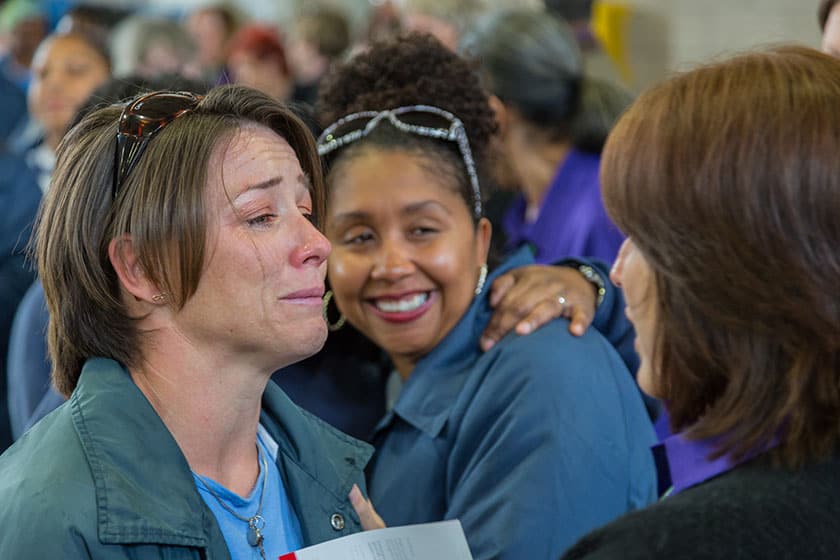
WORKING WITH WOUNDED WOMEN
When it comes to women in behind bars, far too often we're encountering neighbors who have been victimized. Incarcerated women in prison are often at the end of a long, difficult road, one that has made them feel rejected, worthless, and hopeless. Among women in jail, 86% report having experienced sexual violence in their lifetime, and 77% report partner violence. Without resources to heal hurts like these beneath their bad choices, many women may remain in a destructive cycle.
What's more, the guilt of feeling like a failed mother can add to an incarcerated woman's underlying lack of self-esteem. Separation from a child can be overwhelming, leading to a downward spiral of negativity. If incarcerated moms don't find ways to address the pain, they may have trouble sleeping, or problems with prison staff, or even act out until they're put into segregation.
We strive at Prison Fellowship to show women the incredible love, acceptance, and purpose in Christ that awaits them both inside prison and out. We are rapidly expanding our inspirational events, helpful resources, and intensive programs tailored to the unique needs of incarcerated women: Hope Events share the restoration available through the Gospel; a special women's edition of the Inside Journal® prisoner newspaper meets women where they are with inspiration and practical information; and the Academy will expand to at least one women's prison in each state.
Last but not least, our newest ministry, Create: New Beginnings®, is a series of 10 restorative, faith-centered, art-based workshops that help incarcerated women explore core issues of identity and purpose to create new beginnings in their lives behind prison walls and beyond. "I have never discussed my abuse much before, but I realize through this art that I have been in this dark place all these years," said one participant in Minnesota. "Doing this art project has helped me to see that I can be in a better place, a brighter place, and that's what I want to work towards."
We at Prison Fellowship daily witness the transformative power of "This great God" still at work shaping the lives of our neighbors. Through our faith and our works, we're pursuing justice that restores. We invite you to join us.
PUT YOUR FAITH IN ACTION
Send a letter asking your governor to seek restorative solutions and "remember those in prison" by addressing racial disparity in the criminal justice system.
DID YOU ENJOY THIS ARTICLE?
Make sure you don' t miss out on any of our helpful articles and incredible transformation stories! Sign up to receive our weekly newsletter, and you' ll get great content delivered directly to your inbox.
Your privacy is safe with us. We will never sell, trade, or share your personal information.